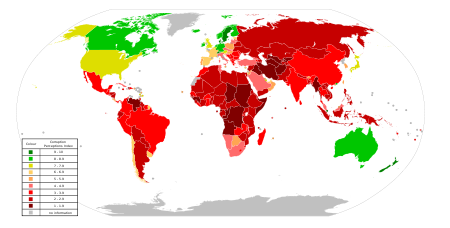
Overview of the index of perception of corruption, 2009. (The highest perception of corruption is colored red, and lowest is colored green.) Source: Wikipedia
According to Transparency International‘s Corruption Perceptions Index, the vast majority of countries in the Middle East and North Africa region score very poorly to various degrees. The often oppressive and hostile policies towards activists and organizations that are involved with civil society and governance (including those that promote transparency and accountability) and the mediocre integration of technology in governance, administration, and everyday life in general have resulted in a negligible use of available technologies and the tools and platforms they provide to promote accountability and institutional integrity.
Major Challenges
Legislative hurdles often stand in the face of NGOs and activists working to promote transparency. For instance, while the constitutions of Syria and Egypt grant the freedom of expression and the establishment of civil society organizations that focus on social or political issues, an Emergency Law in place since the sixties suspends those rights under the pretense of national security and gives unlimited power to the security apparatus to persecute individuals and organizations deemed unfavorable by the authorities. Iran, Saudi Arabia, Syria, Tunisia, and Egypt comprised half of the Committee to Protect Journalists’ 2009 list of the 10 Worst Countries to be a Blogger, which is one indicator of the respective countries’ hostility towards online activism and the use of technology to raise issues of corruption and accountability.
Apart from the legislative hurdles, many countries in the region suffer from low Internet penetration or weak infrastructure and slow connection speeds. According to Internet World Stats, Internet penetration in the Middle East and North Africa is 29.8 percent — a little above the world average of 25.6 percent. Penetration in the countries ranges from 1.1 in Iraq and 1.8 in Yemen to 75.9 percent in the UAE and 88 percent in Bahrain. Weak infrastructure does not help the adoption of tech tools in promoting transparency: the vast majority of Syrian users are still using dial-up connections, and the Lebanese Internet was recently ranked as having the second worst upload speed globally.
Currently, many of the local chapters of Transparency International and other organizations and activists that share the same focus and goals work under the constant risk of scrutiny and persecution of the local authorities. Some of them operate unlicensed in countries that do not allow such organizations or make it extremely difficult to acquire licensing. The most prevalent form of technology adoption is still the most basic — creating a website that holds introductory information about the organization and some resources and articles covering transparency news from around the world.
Success Stories
Despite the aforementioned hurdles, concerned activists and organizations have made some impressive steps utilizing different technological platforms. In 2007, Morocco was buzzing with news about an anonymous activist that went by the name Targuist Sniper; he recorded several videos of identifiable police officers accepting money bribes from drivers of passing trucks and potential smugglers and then uploaded the videos to YouTube, where they were a major hit and received over a million views. Threatening comments were left on his YouTube profile warning him to stop or else, and unfortunately, local police officers to responded to the videos with mass punishment of the residents of his area hoping that would stop him. Eventually, the videos led to the arrest of nine corrupt policemen and the transfer of others. Targuist Sniper is no longer active, but he has demonstrated that an individual assisted by technology can have a huge impact in exposing corruption.
Another distinguished effort is the Sharek961 project in Lebanon. Sharek961 is an Ushahidi-based platform that “empowers Lebanese citizens to promote transparency by sending in eyewitness reports on all election-related incidents or issues” online, by email, or via SMS. Sharek961 received dozens of reports during the 2009 elections season in Lebanon and anonymously published those citizen reports alongside news reports, blog posts, photos, videos and tweets in one place, on an interactive map.
In order to create more remarkable success stories like these, it is important to assist local organizations and activists promoting transparency and fighting corruption in obtaining the technological means and expertise and legal assistance according to their needs in their respective countries. There is a lot of potential in the region, and positive outcomes can be maximized by offering the appropriate form support where needed.








1 comment